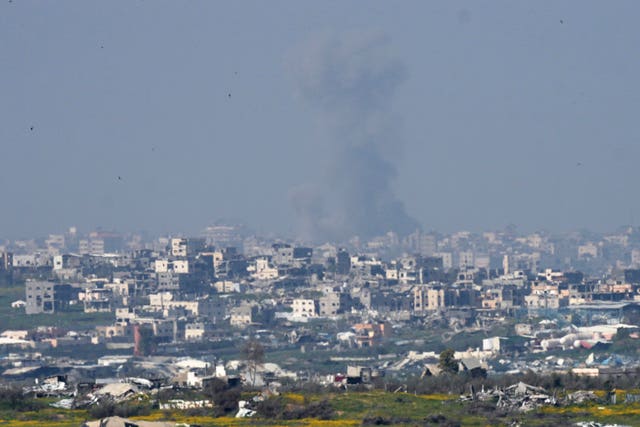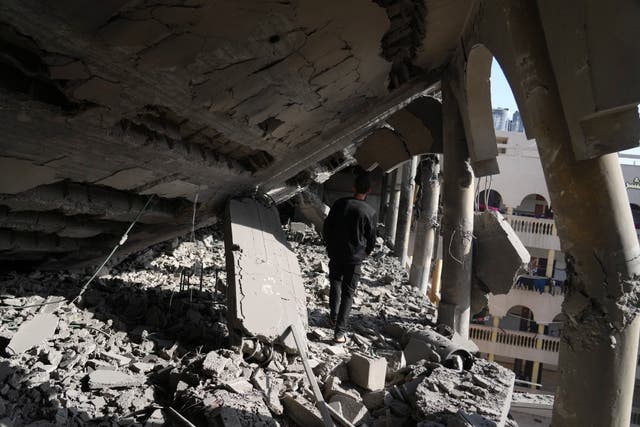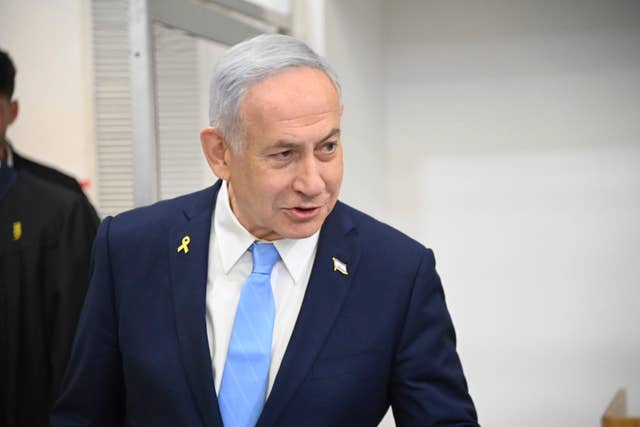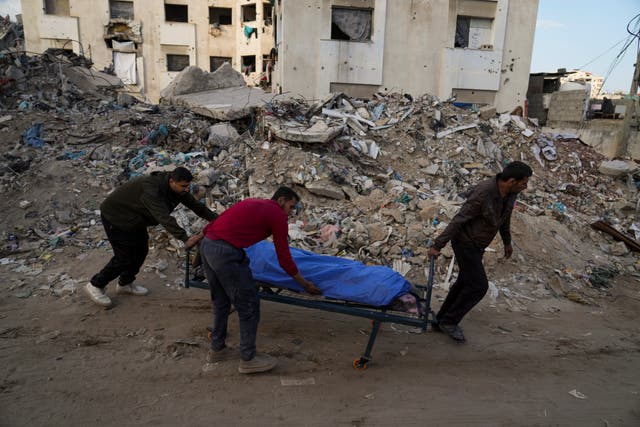What to know about why Israel launched dozens of attacks across Gaza

The body of a Palestinian killed in an Israeli army airstrike is brought to Shifa Hospital in Gaza City. Picture: Abdel Kareem Hana/AP
The relative calm of a ceasefire between Israel and Hamas came to an abrupt end on Tuesday, when Israel launched dozens of attacks on targets across the Gaza Strip.
Palestinian hospital officials say more than 320 people have been killed, including women and children.
Israel says the operation is open-ended and expected to expand, raising fears of the 17-month-old war fully reigniting.

Here’s what to know about how the strikes came about and what might come next.
The ceasefire agreed to in mid-January was a three-phase plan, the first of which actually ended two weeks ago.
Israel baulked at entering substantive negotiations over the second phase, which were meant to lead to a long-term ceasefire, a full Israeli withdrawal from Gaza and the return of all hostages taken by Hamas in its October 7, 2023 attack on Israel that started the war.
The ceasefire was supposed to continue as long as talks over the second phase went on, according to the agreement reached after more than a year of negotiations mediated by the US, Egypt and Qatar.
During the first phase, Hamas returned 25 living hostages and the remains of eight others in exchange for the release of nearly 2,000 Palestinian prisoners.
Israeli forces also withdrew to buffer zones inside Gaza, and hundreds of thousands of displaced Palestinians returned to northern Gaza.
No further hostage releases were called for under the agreement until the second phase.
Hundreds of aid trucks had been entering daily.
But two weeks ago, Israel cut off all food, medicine, fuel, electricity and other supplies to the territory’s around two million people to pressure Hamas to accept a new proposal.

The new plan would require Hamas to release half its remaining hostages — the militant group’s main bargaining chip — in exchange for a ceasefire extension and a promise to negotiate a lasting truce.
Israel made no mention of releasing more Palestinian prisoners — a key component of the first phase.
Hamas refused the new proposal, accusing Israel of trying to sabotage the existing agreement.
Unless mediators step in, Israel’s surprise attack could mean a full return to fighting in a 17-month war that has killed tens of thousands of Palestinians and caused widespread destruction across Gaza.
Prime Minister Benjamin Netanyahu, who has repeatedly threatened to resume the war, said he ordered the strikes because of Hamas’ rejection of the new proposal.
He said Israel “will, from now on, act against Hamas with increasing military strength”.
The White House said it had been consulted and voiced support for Israel’s actions.
Hamas accused Mr Netanyahu of upending the ceasefire agreement and exposing the remaining hostages ”to an unknown fate”.
In a statement, it called on mediators to hold Israel “fully responsible for violating and overturning the agreement”.

The attack came during the Muslim holy month of Ramadan.
No major fighting has occurred in Gaza since the ceasefire took hold on January 19, but Israeli strikes have killed dozens of Palestinians who the military said had entered unauthorised areas, engaged in militant activities or otherwise violated the truce.
Mr Netanyahu has come under mounting domestic pressure, with mass protests planned over his handling of the hostage crisis and his decision to fire the head of Israel’s internal security agency.
Families of hostages still held in Gaza expressed concern Tuesday over their loved ones.
“We are shocked, angry, and terrified by the deliberate dismantling of the process to return our loved ones from the terrible captivity of Hamas,” the Hostages Families Forum said.
But Mr Netanyahu has also faced demands from his hard-line allies not to allow any deal in Gaza that falls short of Hamas’ destruction.
Negotiations with Hamas over a second phase could have brought pressure for compromises over how Gaza will be ruled in the future.
Mr Netanyahu’s critics say his firing of the security agency chief and a string of other dismissals are part of a broader campaign aimed at undermining independent government institutions.

They say he is doing this to maintain power while on trial for alleged corruption and facing public pressure to accept his own responsibility for policy failures in the lead-up to Hamas’ surprise attack on October 7 2023.
A resumption of fighting in Gaza could have repercussions around the region.
Yemen’s Iran-backed Houthi rebels denounced the Israeli strikes, saying “the Palestinian people will not be left alone in this battle” — indicating a possible resumption of the Houthis’ strikes on shipping in the Red Sea and Gulf of Aden.
The US launched new airstrikes over the weekend targeting the Houthis in Yemen in retaliation for its attacks on shipping.
At least 53 people were reported killed.
US President Donald Trump on Monday warned Iran would “suffer the consequences” for any further Houthi attacks, threatening to widen the conflict further.
New Gaza violence could also shake the ceasefire that Israel reached with Hezbollah in November, which stopped months of deadly exchanges of fire over the Israeli-Lebanon border.









